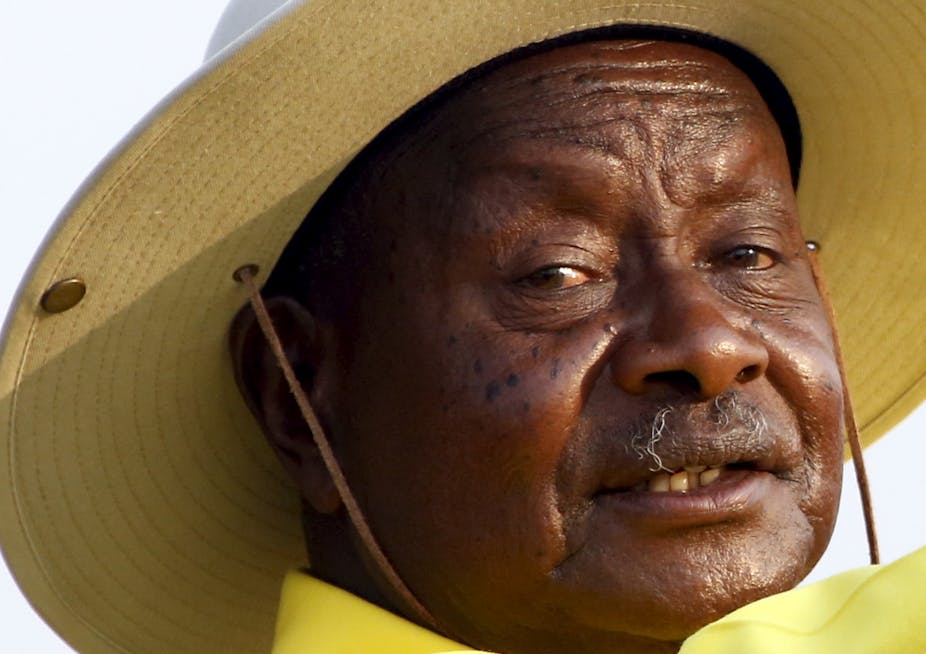On 21 November, Zimbabwean president Robert Mugabe resigned as president under intense pressure from the military, his own party, and mass protests. The news was celebrated on the streets of Harare and also by pro-democracy activists across the continent.
But in Uganda, President Yoweri Museveni – who has been in power for almost 30 years – clings on, plotting to change the constitution so that he can stand in the 2021 elections. So how long can he stay in power?
When multi-party electoral politics were restored in Uganda in 2005, what Museveni was handed in return was the removal of presidential term-limits. This allowed the president, in power since 1986, to repeatedly stand for re-election.
However, the constitution still placed a limit: presidential candidates could not be over 75 years of age. Time flies, and now that restriction stands in Museveni’s way: he will be 76 by the time of the next polls in 2021.
Following a pattern that is emerging across authoritarian states, the president has not proposed the constitutional change himself. Instead, a private member’s bill has been brought to parliament by a sitting member of his National Resistance Movement (NRM). But – as with his selection as the NRM’s sole candidate for the 2016 elections - there seems no doubt that Museveni is behind the plan.
Despite this attempted sleight of hand, the president is not having everything his own way. There were chaotic scenes in parliament when the bill was introduced; popular protests have been violently suppressed, but keep recurring. Several bishops have also denounced the move.
Most significantly, many within the NRM have opposed the change, even in parts of the country that have generally been loyal to Museveni.
Museveni is a wily politician, with a well-used toolbox for maintaining power, and has responded by providing 29 million Uganda shillings (a little over US$7,000) to each sitting member of parliament to facilitate a “consultation” with their constituents. Yet some who received the handout have nonetheless put on the red headband that has come to be the mark of resistance.
Museveni’s hypocrisy
Much of the critical comment on these developments, both within Uganda and internationally, has focused on Museveni’s hypocrisy. As a young radical in the 1980s, he publicly scorned African rulers who clung to power. Now, after 30 years in office, he is clearly clinging pretty hard himself.
The resignation of Mugabe further shines a spotlight on Museveni’s intransigence. Yet in other ways, Museveni has been very consistent. His first public political role was as an organiser of nominations in Milton Obote’s one-party state, nearly 50 years ago, and he has always understood that elections can do useful political work for authoritarians.
Like many of his generation, he saw political parties as divisive. So when he seized power in 1986, Museveni banned political party activity and introduced elections without parties. In this system, all candidates stood on ‘individual merit’, and voters chose those they thought most able to bring development.
Though multi-party politics has returned, the legacy of that system continues today in weak party organisations and the focus on the individual quality of candidates. For Museveni, elections perform a number of different roles. They demonstrate the power of the state – often in a very violent way, as police break-up opposition rallies.
But they also provide a useful vent for tensions, and for communication. Campaigning forces politicians – from the president down – to engage with the public. That engagement tends to take the form of patronage: voters are given immediate gifts – of money or goods. Or they are promised specific rewards – roads, electricity, scholarships. Sometimes, they get at least some of the things they are promised.
That has encouraged accountability of a sort – but it is problematic and locally-focussed, revolving around what candidates deliver to their constituents. As a result, voters turn out to cast their ballots in significant numbers, and Museveni faces neither insurrection nor insurgency.
This is a common phenomenon in contemporary Africa, where the widespread reintroduction of multi-party elections has not always made changes of government more frequent.
But this strategy of political management leaves Museveni with a problem. His dislike of parties, and his brand of patronage politics, have combined to prevent the emergence of any viable successor within the NRM. In fact, Museveni has gone out of his way to undermine MPs from his own party. More than once he has turned on them, urging voters to blame MPs, rather than the government itself, for the multiple woes of everyday life.
The weakness of the NRM as an organisation matters because Museveni does not trust anyone else enough to step aside of his own volition. The ruling party also does not have the structures that would allow the emergence of a successful challenger. Twice in the last 16 years, rivals have sought to challenge Museveni from within the NRM. Kizza Besigye and Amama Mbabazi both found that position in the NRM means little. That includes the apparently powerful position of secretary-general which Mbabazi held for many years. Each was effectively forced out of the NRM, and then defeated by Museveni in flawed elections.
So Uganda is stuck with a president who is good at playing the electoral game and a ruling party which has no way of producing a successor. Museveni may well manage to push the change through. The NRM has an overwhelming parliamentary majority and in the end most MPs will be too reliant on the president’s patronage to defy him.
But the president – and those around him – will surely know that the constitutional change can only defer the problem, and make it more intractable. Indeed, the Ugandan press has not lost the opportunity to editorialise on events in Zimbabwe in ways that indirectly question Museveni’s future. As Robert Mugabe found out to his cost, elections without choice have their uses: but they cannot ensure stable succession.

